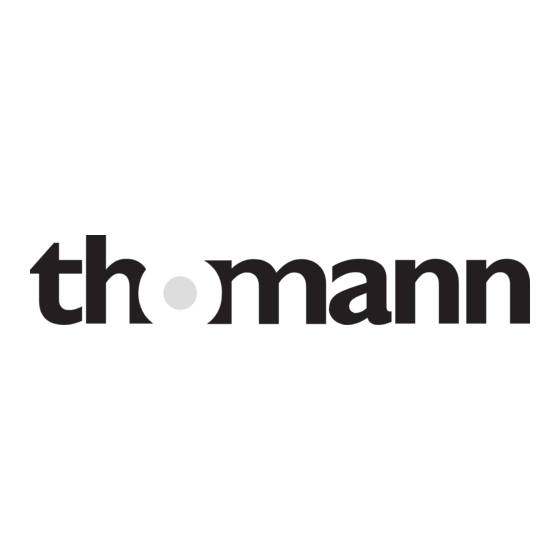
Advertisement
Quick Links
Advertisement

Summary of Contents for thomann the t.bone free solo Antenna Splitter
- Page 1 free solo Antenna Splitter Active Antenna Splitter...
- Page 2 Thomann GmbH Hans-Thomann-Straße 1 96138 Burgebrach Germany Telephone: +49 (0) 9546 9223-0 Internet: www.thomann.de 06.03.2024, ID: 314056 (V5)
-
Page 3: Table Of Contents
Table of contents Table of contents General information..........................5 1.1 Symbols and signal words....................... 5 Safety instructions............................ 7 Features and scope of delivery......................9 Installation and starting up........................ 10 Connections and controls........................13 Technical specifications........................15 Protecting the environment....................... 17 free solo Antenna Splitter Active Antenna Splitter... - Page 4 free solo Antenna Splitter Active Antenna Splitter...
-
Page 5: General Information
Our products and documentation are subject to a process of continuous development. They are therefore subject to change. Please refer to the latest version of the documentation, which is ready for download under www.thomann.de. 1.1 Symbols and signal words In this section you will find an overview of the meaning of symbols and signal words that are used in this document. - Page 6 General information Warning signs Type of danger Warning – danger zone. free solo Antenna Splitter Active Antenna Splitter...
-
Page 7: Safety Instructions
Safety instructions 2 Safety instructions Intended use This device is used in wireless transmission systems to distribute and amplify the incoming antenna signals. Use the device only as described in this user manual. Any other use or use under other operating conditions is considered to be improper and may result in personal injury or property damage. - Page 8 Safety instructions NOTICE! Damage to the device if operated in unsuitable ambient conditions! The device can be damaged if it is operated in unsuitable ambient conditions. Only operate the device indoors within the ambient conditions specified in the “Technical specifications” chapter of this user manual. Avoid operating it in environments with direct sunlight, heavy dirt and strong vibrations.
-
Page 9: Features And Scope Of Delivery
Features and scope of delivery 3 Features and scope of delivery This appliance is used when multiple radio links are to be operated with a single antenna pair. The following features characterise the device: Amplifying the high frequency signal of a pair of antennas and distribution to 4 × 2 antenna outputs in the frequency ranges of 470 MHz to 608 MHz, 614 MHz to 694 MHz, 823 MHz to 832 MHz and 863 MHz to 865 MHz. -
Page 10: Installation And Starting Up
Installation and starting up 4 Installation and starting up Unpack and check carefully there is no transportation damage before using the unit. Keep the equipment packaging. To fully protect the product against vibration, dust and moisture during transportation or storage use the original packaging or your own packaging material suitable for transport or storage, respectively. - Page 11 Installation and starting up Setting up the high-frequency Connect one antenna output pair of the device each to the two antenna inputs of a wireless connection system. To do so, use the supplied BNC cables. Connecting the power supply NOTICE! Damage to the external power supply due to high voltages! The device is powered by an external power supply.
- Page 12 Installation and starting up Example The following figure shows how to connect the device to the optionally available paddles and to four wireless systems. Instead of the paddles, you can also connect the device to the antennas included in the delivery. free solo Antenna Splitter Active Antenna Splitter...
-
Page 13: Connections And Controls
Connections and controls 5 Connections and controls Front ö 1 [POWER] | Main switch. Turns the device on and off. free solo Antenna Splitter Active Antenna Splitter... - Page 14 Connections and controls Back ö & 1 [ANTENNA-B] | BNC panel sockets for the cable connection to the supplied UHF omnidirectional antennas 2 [ANT-1] … [ANT-4] | BNC panel sockets for the cable connection to the connected wireless systems 3 [OUTPUT1] …...
-
Page 15: Technical Specifications
Technical specifications 6 Technical specifications Input connections Power supply 1× Socket for connecting the power adapter Antenna / booster 2× BNC inputs (9V DC for active antennas / booster) Input impedance 50 Ω Output connections Power supply of the connected wireless 4×... - Page 16 Technical specifications Weight 2 kg Ambient conditions Temperature range 0 °C…40 °C Relative humidity 20%…80% (non-condensing) Further information Component type Antenna splitter free solo Antenna Splitter Active Antenna Splitter...
-
Page 17: Protecting The Environment
Protecting the environment 7 Protecting the environment Disposal of the packing material Environmentally friendly materials have been chosen for the packaging. These materials can be sent for normal recycling. Ensure that plastic bags, packaging, etc. are disposed of in the proper manner. - Page 18 Repairing a device or passing it on to another user is an ecologically valuable alternative to disposal. You can return your old device to Thomann GmbH at no charge. Check the current conditions on www.thomann.de. If your old device contains personal data, delete those data before disposing of it.
- Page 20 Musikhaus Thomann · Hans-Thomann-Straße 1 · 96138 Burgebrach · Germany · www.thomann.de...


Need help?
Do you have a question about the the t.bone free solo Antenna Splitter and is the answer not in the manual?
Questions and answers